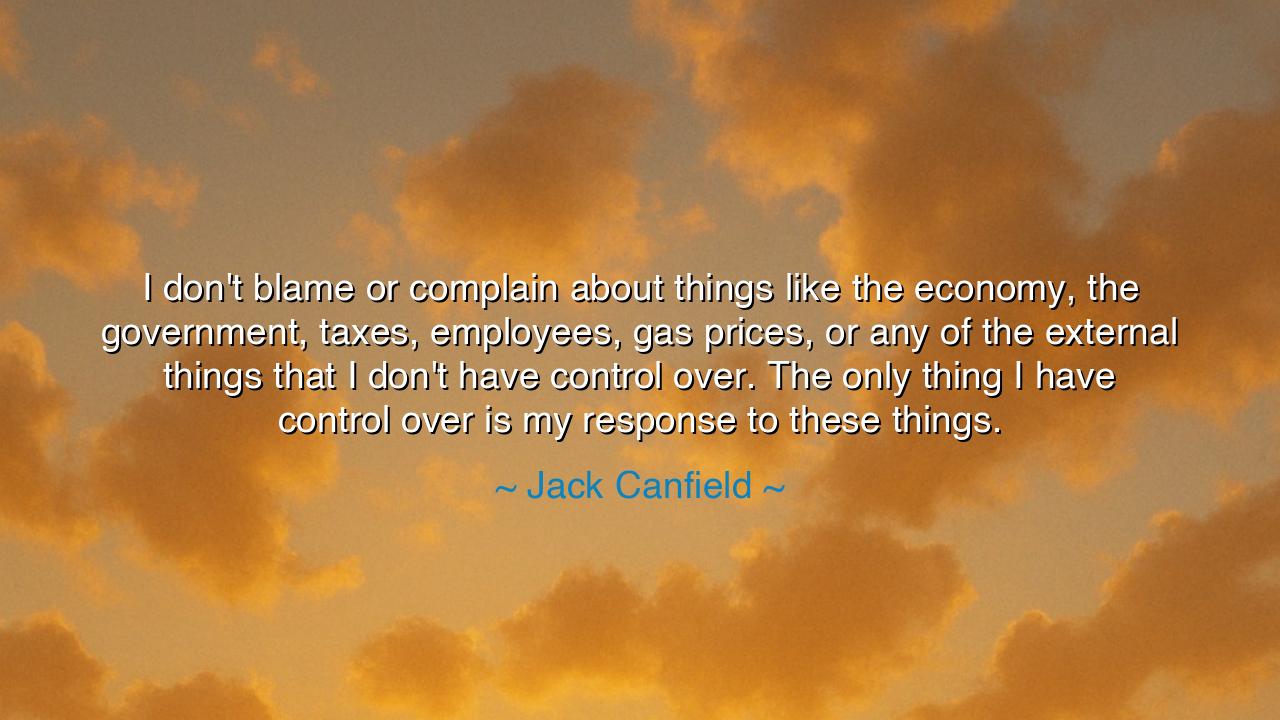
I don't blame or complain about things like the economy, the
I don't blame or complain about things like the economy, the government, taxes, employees, gas prices, or any of the external things that I don't have control over. The only thing I have control over is my response to these things.






The words of Jack Canfield, teacher, writer, and sage of personal mastery, carry the calm authority of one who has conquered the inner storms of blame: “I don't blame or complain about things like the economy, the government, taxes, employees, gas prices, or any of the external things that I don't have control over. The only thing I have control over is my response to these things.” This declaration is not a mere expression of optimism—it is a call to inner sovereignty, a reminder that true power does not come from changing the world outside, but from mastering the world within. Canfield speaks with the voice of wisdom that has echoed since the time of the Stoics, who taught that while fate governs circumstances, the human spirit governs choice.
At the heart of this quote lies the eternal principle of self-responsibility. Every age has its excuses: rulers blame the heavens, the poor blame the rich, the rich blame the markets, and the masses blame the government. Yet, in the endless circle of accusation, no progress is ever made. Canfield’s words break this cycle by turning the gaze inward. He reminds us that we cannot command the tides of life, but we can learn to sail upon them. To live by his creed is to reject victimhood and to claim the quiet dignity of personal control. It is to stand in the midst of chaos and declare: “Though I cannot change the wind, I will still set my sails.”
The origin of these words reflects Canfield’s lifelong study of achievement and human potential. As the co-creator of Chicken Soup for the Soul and a pioneer in the field of motivational science, he has dedicated his life to teaching that success begins with mindset. His philosophy springs from a truth older than civilization: that our reactions, not our conditions, shape our destiny. This is the same wisdom that guided Epictetus, the Greek slave who became a philosopher, and taught that while no man can control external events, every man can control his mind. Canfield’s modern phrasing is but a new vessel for that ancient fire—the flame of self-mastery that burns against despair.
Throughout history, the greatest souls have embodied this very principle. Consider Viktor Frankl, the psychiatrist who endured the horrors of Nazi concentration camps. Stripped of freedom, possessions, and even family, he discovered one freedom that no captor could steal—the freedom to choose his attitude. From that furnace of suffering was born his immortal book, Man’s Search for Meaning, which echoes Canfield’s truth: the last of human liberties is the power to respond, not react. In this way, the powerless man becomes powerful, for his strength is not in control over circumstance, but in the mastery of his soul.
Canfield’s teaching challenges the human tendency toward complaint. It is easy to curse the economy, the government, or the world’s injustices; but such complaints, though loud, are hollow. They drain energy while yielding no change. To rise above complaint is to reclaim one’s strength. It is to understand that the external world is a mirror, reflecting not fate’s cruelty, but our response to it. A wise person does not waste breath on lamentation; he bends reality to the strength of his inner will. The coward blames; the warrior adapts.
There is also a deep spiritual current in Canfield’s words. He reminds us that acceptance is not weakness. To accept what cannot be controlled is to align oneself with the rhythm of the universe. The oak that resists the wind breaks; the reed that bends survives. Acceptance is not surrender—it is wisdom in motion. In refusing to complain about taxes or fuel or politics, one does not become indifferent, but liberated. For every ounce of attention given to what cannot be changed is an ounce stolen from what can. And those who master this discipline find that peace is not found in changing the world, but in changing how one meets it.
The lesson, therefore, is timeless: your response is your kingdom. Protect it fiercely. When the world trembles, hold fast to composure. When others rage, practice clarity. When fortune turns her back, stand firm in gratitude. Each moment offers a choice—to react in anger or to respond with purpose. The wise will always choose the latter, for in that choice lies all freedom. The foolish spend their years railing against forces they cannot command; the wise spend theirs transforming what they can—themselves.
So let this truth be carried forward, as a law for the heart: control what is within, release what is beyond. Do not let the storms of politics or economy cloud the serenity of your mind. Do not waste the sacred breath of life on complaint. Instead, like Canfield, choose mastery. Let your calm be your protest, your discipline your rebellion, your grace your victory. For in this age and every age, those who rule themselves rule the world.






AAdministratorAdministrator
Welcome, honored guests. Please leave a comment, we will respond soon